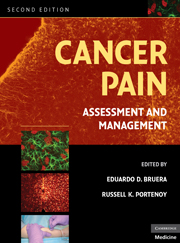Book contents
- Frontmatter
- Contents
- Contributors
- Preface
- SECTION I MECHANISMS AND EPIDEMIOLOGY
- SECTION II EPIDEMIOLOGY AND SYNDROMES
- SECTION III ASSESSMENT
- SECTION IV PHARMACOLOGICAL TREATMENT
- SECTION V OTHER INTERVENTIONAL STRATEGIES
- SECTION VI REHABILITATION AND PSYCHOLOGICAL INTERVENTIONS
- 18 Psychological interventions for cancer pain
- 19 Rehabilitation medicine interventions
- SECTION VII THE ROLE OF ANTINEOPLASTIC THERAPIES IN PAIN CONTROL
- SECTION VIII PAIN IN SPECIAL POPULATIONS
- SECTION IX DIFFICULT PAIN PROBLEMS
- SECTION X SYSTEMS OF CARE
- Index
- Plate section
- References
18 - Psychological interventions for cancer pain
from SECTION VI - REHABILITATION AND PSYCHOLOGICAL INTERVENTIONS
Published online by Cambridge University Press: 06 July 2010
- Frontmatter
- Contents
- Contributors
- Preface
- SECTION I MECHANISMS AND EPIDEMIOLOGY
- SECTION II EPIDEMIOLOGY AND SYNDROMES
- SECTION III ASSESSMENT
- SECTION IV PHARMACOLOGICAL TREATMENT
- SECTION V OTHER INTERVENTIONAL STRATEGIES
- SECTION VI REHABILITATION AND PSYCHOLOGICAL INTERVENTIONS
- 18 Psychological interventions for cancer pain
- 19 Rehabilitation medicine interventions
- SECTION VII THE ROLE OF ANTINEOPLASTIC THERAPIES IN PAIN CONTROL
- SECTION VIII PAIN IN SPECIAL POPULATIONS
- SECTION IX DIFFICULT PAIN PROBLEMS
- SECTION X SYSTEMS OF CARE
- Index
- Plate section
- References
Summary
Over the past 15 years, psychological interventions have emerged as a useful adjunct to medical approaches to cancer pain management. Psychological interventions offer several advantages in cancer pain management. First, they can enhance patients' sense of self-efficacy (i.e., confidence) in their own abilities to control pain. Increased self-efficacy for pain control has been linked to lower psychological distress, less interference of pain with daily activities, and improved quality of life. Second, psychological interventions teach patients skills that can be applied to many of the day-to-day challenges of living with persistent pain, such as coping with pain flares, managing emotional reactions to pain (e.g., anxiety, fear, depression), and maintaining an active and rewarding life despite having pain. Third, psychological interventions and pain medications may have synergistic effects for cancer patients and produce an array of benefits (e.g., decreased pain, improved mood, enhanced interpersonal interactions) that may not be achieved by alone. Finally, psychological interventions may offer a viable pain management option for patients who respond poorly or have difficulty tolerating pain medications.
This chapter provides an introduction to psychological approaches to managing cancer pain. The chapter is divided into three sections. The first section highlights the challenges of cancer pain. This section emphasizes the fact that psychological interventions for pain are delivered in the context of multiple ongoing challenges faced by persons having cancer pain.
- Type
- Chapter
- Information
- Cancer PainAssessment and Management, pp. 343 - 353Publisher: Cambridge University PressPrint publication year: 2009

